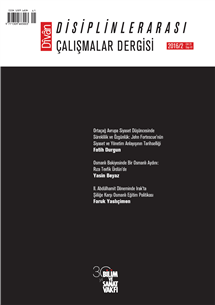41
Dîvân’ın 41. sayısı Ortaçağ Avrupa siyaset düşüncesi, geç Osmanlı dönemi eğitim politikaları ve Rıza Tevfik’in Ürdün’deki yaşamı ile ilgili makaleleri içeriyor. Ayrıca, tarih, sosyoloji ve İslami ilimler alanlarındaki güncel yazını takip eden zengin kitap değerlendirme bölümünü de okurlara sunuyor.
Articles
John Fortescue was the most important political thinker of Late Medieval England and his political writings are still the subject of heated debates among scholars. As a jurist and statesman, Fortescue wrote his works in a period of political and social disorder known as the Wars of the Roses, when Lancastrians and Yorkists were engaged in a civil war for the English Crown. Fortescue made a very authentic contribution to the history of political thought through his distinction between the concept of Royal Rule (dominium regale) and his own conceptualization of Political and Royal Rule (dominium politicum et regale). In Fortescue’s thought, while Royal Rule characterizes the position of a king with absolute authority, Political and Royal Rule describes a system wherein the king looks to secure the support of his subjects in the decision-making process and where his will is limited through English Common Law. Fortescue’s conceptualization has been considered an obvious instance of English Constitutionalism by those arguing that English political thought was distinct from that in Continental Europe. On the other hand, it has been asserted that Fortescue’s political understanding was distinct from traditional theologybased medieval political theory, since he was a secular jurist. Fortescue’s historical context, however, has been neglected. This article offers a reading of Fortescue’s political works within their political and historical contexts. As opposed to the prevailing view, this study argues that Fortescue’s political thought was not an encompassing meta-narrative addressing future generations. Fortescue’s political understanding sought a solution to the political and social crisis of his time, and he never aimed at thinking outside the box of traditional medieval political thought. The essential value of his thought is the perspective it offers on the conditions of the newly emerging body of professional jurists during the period, and that it does so firmly within the bounds of Medieval thought.
Fatih DURGUNIn the final years of the Ottoman Empire, Arabs revolted many times. Their breakaway from the empire accelerated with the Great Arab Revolt in 1916. During the dissolution of the empire that began in 1919, many large and small states were founded. Many Ottoman intellectuals—who for one reason or another opted to leave the empire during this period—migrated to these states and played a key role in founding them. These intellectuals transmitted their experiences to these newly founded states. This study focuses on Rıza Tevfik, who first fled to Egypt and then to Jordan, where he conducted political, administrative, and cultural activities. It bases its discussion of Tevfik on various historical sources, including Arab newspapers of the period.
Yasin BEYAZTowards the end of the nineteenth century, Ottoman authorities realized that the Sunni orthopraxy and ipso facto state sovereignty in Iraq was in danger. They believed that the great numbers of Sunni masses converting to Shiism could pose a serious political risk in the near future. To guarantee the political loyalties of the subjects living in Iraq, the Ottoman authorities formulated a policy of education to protect and correct beliefs. This article explains how the Ottoman government during the time of Abdülhamid II applied counter-measures against the perceived spread of Shiism in Iraq. These included appointing single Sunni professors to madrasas, sending itinerant preachers among the tribesmen to teach them the basic tenets of Sunnism, opening modern schools, and taking Iraqi Shiite boys at an early age to Istanbul to change their beliefs. The article further addresses issues that emerged during the implementation of this policy, such as the questions of whether to select local or non-local ulama and how to overcome financial challenges. Overall, the Ottoman policy of education aimed at disseminating an identity of Ottomanness (Osmanlılık) that included the correction of the beliefs of non-Sunni Muslim groups. This also meant re-defining Ottomanness in closer association with the Sunni interpretation of Islam.
Faruk YASLIÇİMEN





